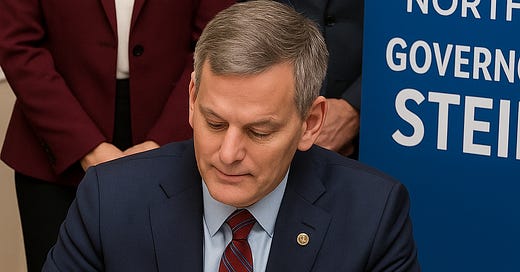North Carolina now lets physician associates work
The Tarheel state is now the 7th state to give PAs a pathway to independent practice
Above image created with ChatGPT.
In my post two months ago, I highlighted recent developments with respect to physician associate/assistant (PAs) independent practice and new research on the potential effects. Last week, Governor Stein in North Carolina signed HB67 into law. In addition to granting PAs the ability to work to their fullest potential, the legislation contains several other elements geared towards increasing healthcare supply in the state.
The legislation has some good elements, and some unnecessary and potentially costly elements. Let’s dive in:
The good:
Pathway to independent PA practice.
PAs with 5,000 hours of clinical practice are eligible to work independently of physicians. This helps PAs better fill in gaps in access to care in the state.
Pathway for foreign-trained physicians to legally work in the state
Foreign trained physicians will have an easier time working at a hospital or in medical practices in rural parts of the state. This will also help alleviate physician shortages in the state.
Pathway for independent master’s level psychologist practice
Psychological associates are health providers with master’s degrees that work under the supervision of licensed psychologists. Twenty states permit providers to obtain a license to work with a master’s degree, but may not use the term “psychological associate” to describe the profession. Given the dire need for mental health providers, this reform will also help boost healthcare supply in the state. North Carolina has now joined six other states that give master’s level psychologists a pathway to independent practice.
Pharmacist test and treat
Pharmacists in the state can now perform simple Clinical Laboratory Improvement Amendments (CLIA) tests and treat patients with the flu. This saves an unnecessary step for residents to see a doctor to get treatment for a potentially serious, but easily treatable illness.
Recognition for marriage and family therapist licensees
Marriage and family therapists provide a great example of how recognition should work for all health professions. No overly bureaucratic and time-consuming compact. Instead, a short half-page section requiring North Carolina to issue licenses to licensed therapists that have been working for at least 2 years. I’d prefer if the period were shortened to one-year, but this is still much better than any compact. Speaking of compacts….
The bad
Joining the interstate medical licensure compact (IMLC)
Like other compacts, the IMLC is an expensive and overly bureaucratic means of allowing physicians to work across state lines. Universal recognition is a much better approach and wouldn’t require the state to pass separate legislation for each profession.
Joining the physician assistant compact
Similar logic here. It would be much more efficient for North Carolina to pass universal recognition and include physician assistants as a profession that could take advantage of the reform. Even worse than the IMLC, the physician assistant compact is not yet active. It will be at least another 18 months until the bureaucracy moves forward.
All in all, there is more good than bad in this new law. Last week, Governor Stein also signed HB763— a reform that I commented on in a previous post. Hopefully this will spur further reform that leads to unfettered universal recognition in the state.
North Carolina residents will benefit from the enactment of HB67. Simple and commonsense reform that helps boost healthcare supply are always a welcome development. Hopefully states will soon learn that compacts, however, are just a waste of time and resources. Simple recognition is the best model for improving practitioner mobility.




